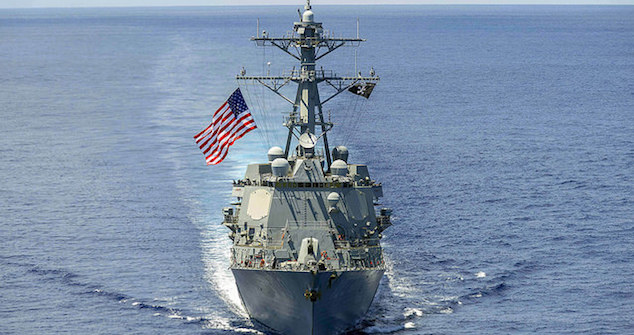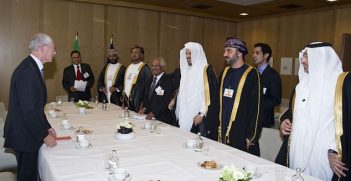Understanding ANZUS: Unpacking Australia's Treaty Commitments

ANZUS is a trade off with some unexpected obligations.
Recent polling suggests that support for Australia’s US alliance remains strong but the public expects Canberra to remain neutral should Australia’s ally enter into war over the dispute in the East China Sea. Leading political figures and commentators alike argue it is in Australia’s interests to stay out of such a war. This would likely prove impossible and it is disingenuous to pretend otherwise.
The Lowy Institute’s 2014 Australian Attitudes to the World Poll found support for ANZUS to be at 85 per cent. This is consistent with both the history of Lowy’s polling and polling conducted by other organisations over many years. ANZUS is overwhelmingly popular. On the other hand, a survey released this month by the Australia China Relations Institute (ACRI) headed by Bob Carr, suggests some serious qualifications with respect to support when it comes to a potential war in the East China Sea. 71 per cent of those surveyed stated they were against Australia taking sides in a dispute over the Senkaku/Diaoyu Islands. Furthermore, 68 per cent of respondents said that any approach made to the Australian prime minister by the American president “to ask Australia to join the Japanese and Americans” should be declined. When it comes to ANZUS it appears that Australians want to have it both ways.
Is this a realistic understanding of Australia’s alliance commitments? No, but the public could be excused for thinking so. A plethora of former and current ministers, academics and assorted commentators have long advanced the notion that Australia’s interests would be best served by sitting out any potential war between our key trade and security partners. In 2004 Alexander Downer said that a war between the US and China over Taiwan need not necessarily involve Australia. More recently former defence minister David Johnston speculated that ANZUS would not automatically apply to a war in the East China Sea. In response to the recent ACRI survey, Bob Carr praised the common sense of the Australian people for preferring to choose their own battles. All well and good, but do we seriously expect that ANZUS would survive if Australia failed to stand alongside its ally?
Canberra’s alliance relationship with Washington is based upon both the text of ANZUS treaty and upon each side’s expectations. While the text is there in black and white, and has not changed since 1951, expectations are more difficult to define and are often only articulated at a time of crisis.
The NATO Treaty empathetically states that an armed attack on any of the signatories is considered to be an attack on all. ANZUS stops short of this. Article III pledges to consult in the advent of a security threat in the Pacific, while article IV uses somewhat stronger language in promising to “act to meet the common danger” (though with the caveat that this be done in line with constitutional processes). Article V states that the treaty applies to an armed attack on each party’s metropolitan territory, territory in the Pacific or, crucially, or on “its armed forces, public vessels or aircraft in the Pacific”.
Differing interpretation of the treaty are almost as old as ANZUS itself. In the mid-1950s Sir Robert Menzies made it clear that Australia felt no obligation to join in a war with the US to defend Taiwan. In the 1960s the Kennedy administration was not forthcoming in its guarantees of support to Canberra in relation to a potential war with Indonesia.
In the wake of Downer’s 2004 comments over Taiwan, then Ambassador Tom Schiffer revealed American expectations that Australian forces would fight alongside their allies if it ever came to war. This was reinforced by then deputy secretary of state Richard Armitage who pointed out that the alliance was not an a la carte menu from which one could pick and choose. These comments belong to another administration and another decade, but nothing in my own experience tells me that Washington’s expectations have lessened. Indeed, growing tensions have raised them. From Washington’s point of view an Australian failure to put its “rubber to the road” if it were to come to war would necessarily mean the end of the alliance. For Australians to assume otherwise is folly.
In any case it is unlikely that Australia could sit out a US–China war even if it tried. How can this be? Does Canberra not have autonomy in such matters? Yes and no. Ultimately any decision to commit forces is the prerogative of the prime minister who customarily acts in consultation with the National Security Committee of Cabinet. However, any prime minister confronted with the aforementioned scenario will also be confronted with certain realities, both political and military.
Myriad reasons (ranging from growing integration between the ADF and US military, shared intelligence and our hosting of Joint Facilities like Pine Gap) mean that Australia would find itself actively supporting the US war effort as soon as the first shots were fired. Extracting Australia from those arrangements would be difficult to say the least. The facilities are vital to the US early warning system for ICBM launches. Washington cannot easily do without them. It might be possible to limit Australia’s involvement to logistical and intelligence support (it would make sense to reorientate Australia’s alliance contribution along those lines) but it is hard to see how China would regard this as anything but hostile. Menzies’s reluctance over Taiwan predated the establishment of Pine Gap. A contemporary prime minister may find his or her options to be more limited.
How do we reconcile strong public support for ANZUS with opposition to backing the US over a possible war in the East China Sea? On one hand we should welcome it. Australians do not relish the prospect of war in general and in this particular scenario the public no doubt recognises the clash of traditional security interests with emerging economic ones. It is also indicative of the fact that Australians have long enjoyed an alliance that offers much and asks little of us in return. Unlike other US allies, Australia does not host permanent bases of American forces on its soil. True, Australia is a frequent contributors to US military operations but those contributions are traditionally niche ones.
Like any alliance, ANZUS is a trade off. Australia receives a security guarantee that includes extended nuclear deterrence, as well as unique levels of intelligence and technology sharing. Without ANZUS Australia would be compelled to spend far more on defence and thus less on education and health. In return Australia makes certain commitments.
Is the trade off worth it? Absolutely. Does it reduce Australia’s freedom of action? Yes. The public and policy makers alike should understand this. Perhaps the most telling finding from the ACRI survey is that only 40 per cent of respondents were aware of the dispute between China and Japan over the islands. That number is bound to rise.
Cam Hawker is President of the AIIA ACT and a former adviser on Defence to the Abbott Government. He is currently undertaking Ph.D. research on the history of Australian Prime Ministers’ management of the ANZUS Alliance. This article can be republished with attribution under a Creative Commons Licence.





